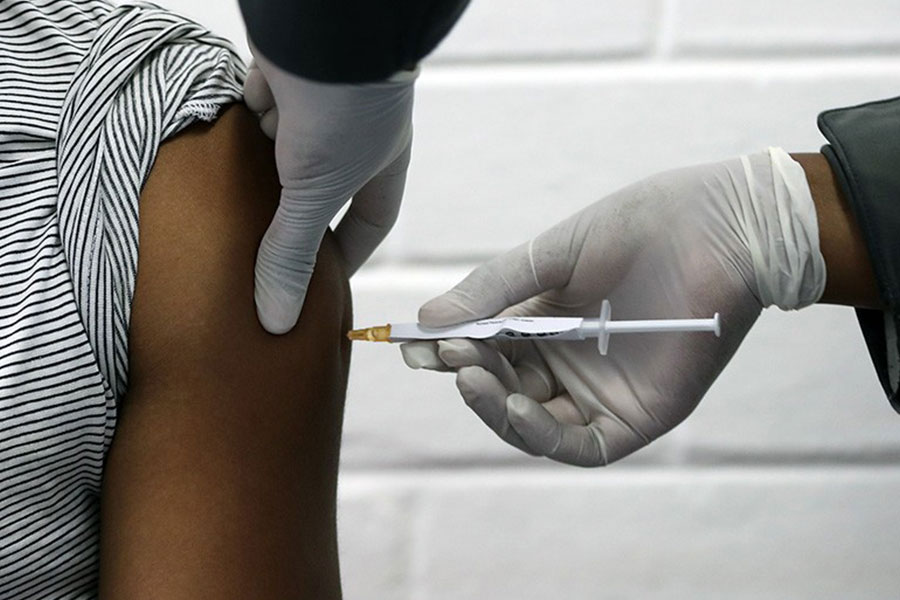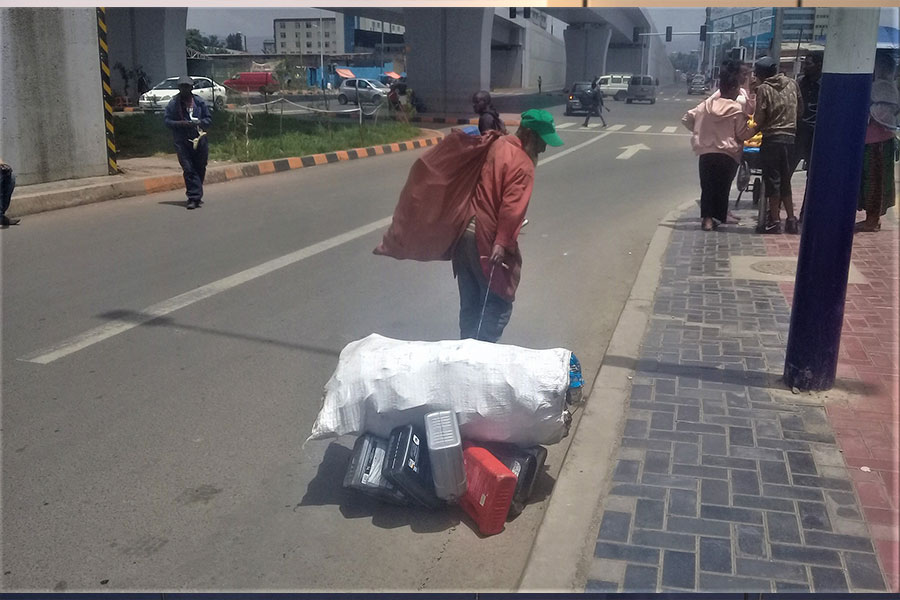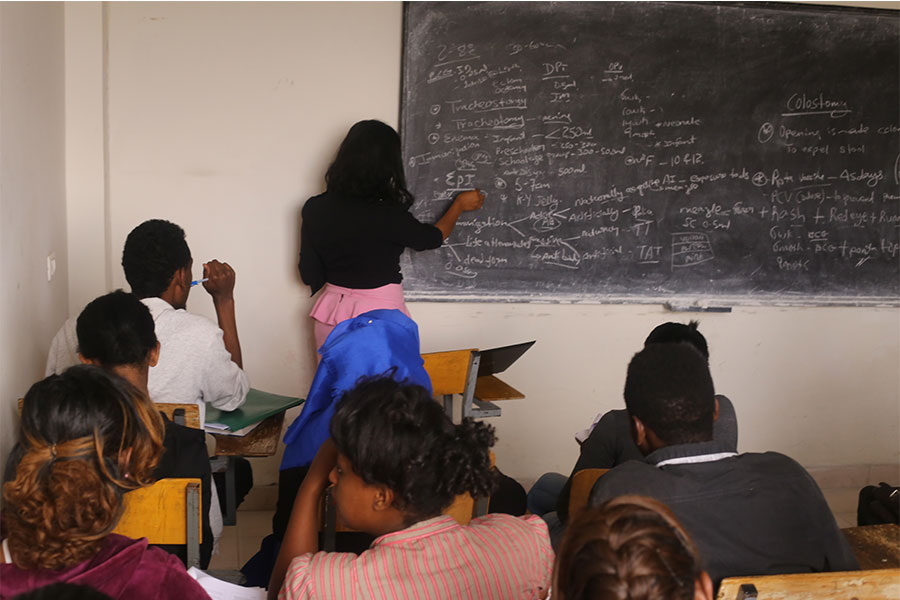
Fortune News | Dec 17,2022
The Ethiopian Commodity Exchange (ECX) is introducing a special trading window for sesame to ease supply shortages facing exporters of the oilseed. To open in the coming days, the window will trade once a week.
This marks the second time the ECX has opened a window for agro-processors. Two years ago, the Exchange established a window to allow exporters and processors of soybean to get the legume from the central market.
The sesame trade has been rocked by the militarized conflict in the country's north, particularly in the Amhara and Tigray regional states, which account for 90pc of total sesame production. The war has exacerbated a decline in revenues from sesame exports, dropping by almost 115 million dollars last year from 450 million dollars five years ago. Sesame was the second-most valuable agricultural commodity next to coffee, earning the country the highest export revenues.
Industry players attribute the dwindling earnings to price volatility in the global market, currency fluctuations and a fall in productivity, the latter due to the ongoing war.
Two years ago, 309,000 smallholder farmers harvested 3.6 million quintals of sesame cultivated on 369,000hct of land, mainly in the western regions of Tigray Regional State, including Humera and Welqayit, and in central and west Gonder of the Amhara Regional State. The war has had a devastating effect on agricultural productivity, although data from the Tigray Regional State is hard to come by. However, the Amhara Regional State officials say the fighting has left close to 300,000hct of land unploughed this year.
Unable to source a sufficient volume of sesame from the ECX, the managers of a few agro-processing companies approached the Ministry of Trade & Regional Integration for redress. The Ministry recommended the Exchange allows select agro-processors to transact on its floors through a special window, according to Wondimagegnehu Negera, chief executive officer (CEO) of the ECX.
“We've been preparing for the last three months,” Wondimagegnehu told Fortune.
Three exporters and agro-processors have already been selected. The Trade Ministry is responsible for regulating the volume of sesame they can buy from the ECX trading floor.
Incorporated in 2008 with an initial capital of 30 million Br, Oliva Agro-Industry Plc is among the agro-processors granted the permit. The company ships organic and conventional hulled sesame to high-value markets abroad, including the United States and Europe. Oliva had been sourcing 15,000qtl of the oilseed annually from Humera through contract farming.
Humera is a hub of sesame production, known for its high-quality, aromatic, white seed in high demand in international markets for its suitability for baking. Farmers in the area produce up to 150,000qtl annually.
Oliva Agro-Industry processes the oilseeds at its hulling and roasting plant in Burayu town, Oromia Regional State, in the outskirts of Addis Abeba. Disruptions to the sesame value chain had forced the company to buy the commodity from the ECX through intermediaries. However, the supply remains far from meeting demands.
Last year, the company secured a deal with a US-based buyer to supply 43 containers of hulled sesame. A tonne of hulled sesame seeds can be sold for 2,200 dollars, 55pc higher than the price of the raw product. A container can accommodate 19tn of the oilseed.
However, Oliva has struggled to keep up its end of the deal.
“We've only managed to send eight containers of hulled sesame,” says Capital Atmoisa, CEO of the company. “We're forced to renegotiate with the buyers since the deal expired last September.”
The ordeal has had a "profound" effect on the company's profitability and reputation, says the CEO.
VitaBite Nutrition Plc, incorporated in 2015, and KROTAJ Tahini Manufacturers Plc are the other two allowed to trade using the window.
KROTAJ was incorporated as a joint venture between K. Mikedem of Ethiopia, RENEW Investment Strategies LLC of the US, and the Israeli firm J & O, in 2018, with 4.5 million dollars in capital. It exports tahini, a condiment made from toasted hulled sesame, and processes the oilseed at its plant in the Haile Garment area of Nifas Silk Laphto District.
These agro-processors can trade through the special window in market centres in Addis Abeba, Hawassa, Neqemte, Gonder, Jimma, and Adama.
Daniel Alemayehu, a former lecturer on food processing technology at Haromaya University for 11 years, emphasises that value addition is crucial to improving export revenues from oilseeds and other agricultural products. But, much needs to be done to substitute imported food items by producing locally, according to Daniel.
Bereket Meseret, trading operations manager at the ECX, hopes to see the agro-processors substitute imported food items in the long run.
Daniel, however, warns the task will be challenging to accomplish without weening the agricultural sector off subsistence and rain-fed farming practices.
“Farmers with relatively small holdings can't produce a surplus to satisfy the demands of agro-processors,” he said.
Ten agro-processors were permitted to buy soybean from the special window last year. The number has doubled since, though it is far below the window's capacity to accommodate up to 200 buyers at a time. Close to 48,000tn of soybean worth 1.2 billion Br was traded through ECX.
Half of the volume was facilitated through the special trading window, which shows that the undertaking can be successful, according to Bereket. He disclosed that the ECX will up the number of days the sesame window is open after evaluating the performance of the three agro-processors. Last year, the ECX facilitated the trading of over 614,000tn of agricultural commodities worth 39.6 billion Br.
PUBLISHED ON
Feb 26,2022 [ VOL
22 , NO
1139]

Fortune News | Dec 17,2022

Covid-19 | Jun 12,2021

Radar | Sep 24,2022

Fortune News | May 25,2019

Fortune News | Jun 20,2025

Radar | Jul 31,2021

Commentaries | Nov 27,2021

Fortune News | Apr 02,2022

Life Matters | Aug 03,2024

Fortune News | Aug 12,2023

Dec 22 , 2024 . By TIZITA SHEWAFERAW
Charged with transforming colossal state-owned enterprises into modern and competitiv...

Aug 18 , 2024 . By AKSAH ITALO
Although predictable Yonas Zerihun's job in the ride-hailing service is not immune to...

Jul 28 , 2024 . By TIZITA SHEWAFERAW
Unhabitual, perhaps too many, Samuel Gebreyohannes, 38, used to occasionally enjoy a couple of beers at breakfast. However, he recently swit...

Jul 13 , 2024 . By AKSAH ITALO
Investors who rely on tractors, trucks, and field vehicles for commuting, transporting commodities, and f...

Oct 25 , 2025
The regulatory machinery is on overdrive. In only two years, no fewer than 35 new pro...

Oct 18 , 2025
The political establishment, notably the ruling party and its top brass, has become p...

Oct 11 , 2025
Ladislas Farago, a roving Associated Press (AP) correspondent, arrived in Ethiopia in...

Oct 4 , 2025
Eyob Tekalegn (PhD) had been in the Governor's chair for only weeks when, on Septembe...